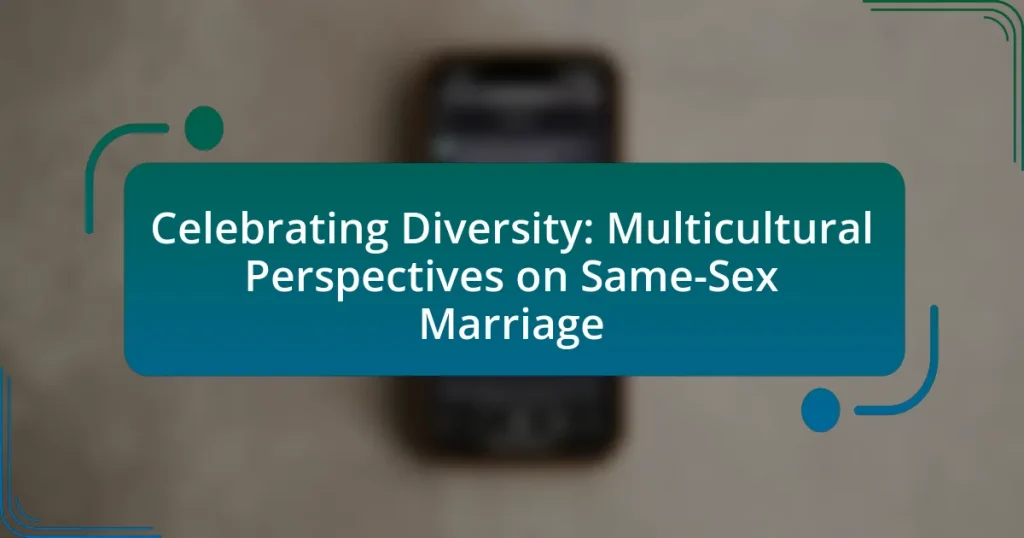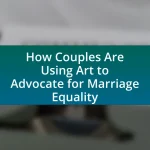The article “Celebrating Diversity: Multicultural Perspectives on Same-Sex Marriage” examines the significance of recognizing and valuing LGBTQ+ identities within the context of same-sex marriage. It explores how multicultural perspectives influence societal attitudes, legal frameworks, and cultural beliefs surrounding same-sex unions. Key topics include the impact of cultural factors, religious views, and personal narratives on acceptance, as well as the role of representation and legal recognition in enhancing the social status of same-sex couples. The article emphasizes the importance of fostering inclusivity and understanding through dialogue and education to promote diverse perspectives on same-sex marriage globally.
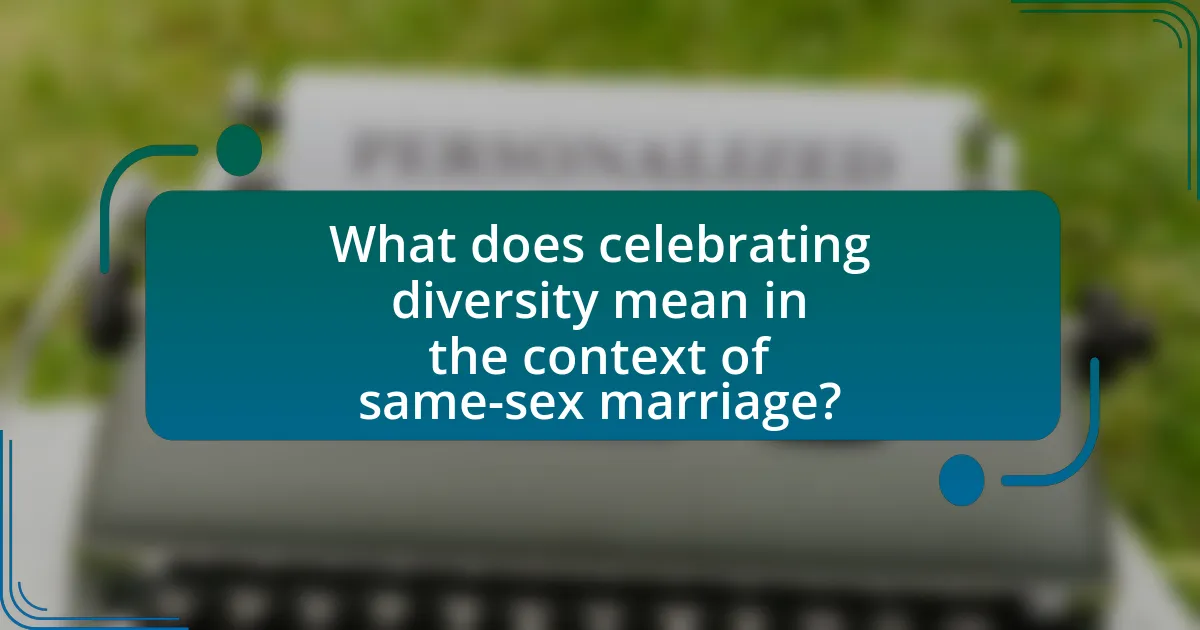
What does celebrating diversity mean in the context of same-sex marriage?
Celebrating diversity in the context of same-sex marriage means recognizing and valuing the unique identities, experiences, and contributions of LGBTQ+ individuals and communities. This celebration fosters an inclusive society where same-sex relationships are acknowledged as valid and equal to heterosexual relationships. Evidence of this can be seen in the legalization of same-sex marriage in numerous countries, which reflects a broader societal acceptance and affirmation of diverse sexual orientations, promoting equality and human rights for all individuals, regardless of their sexual identity.
How do multicultural perspectives shape the understanding of same-sex marriage?
Multicultural perspectives significantly shape the understanding of same-sex marriage by highlighting diverse cultural beliefs, values, and legal frameworks surrounding sexual orientation and marriage. For instance, in many Western cultures, same-sex marriage is increasingly accepted and legally recognized, reflecting a shift towards individual rights and equality. Conversely, in various non-Western cultures, traditional views may prioritize heterosexual unions, often influenced by religious or historical contexts, which can lead to resistance against same-sex marriage. Research indicates that countries with more multicultural policies tend to have more progressive stances on same-sex marriage, as seen in nations like Canada and the Netherlands, where legal recognition aligns with broader human rights frameworks. This interplay of cultural norms and legal recognition illustrates how multicultural perspectives can either support or challenge the acceptance of same-sex marriage globally.
What cultural factors influence attitudes towards same-sex marriage?
Cultural factors that influence attitudes towards same-sex marriage include religious beliefs, societal norms, and historical context. Religious beliefs often dictate moral views on marriage, with many faiths traditionally opposing same-sex unions, impacting followers’ acceptance levels. Societal norms, shaped by cultural heritage and community values, can either promote inclusivity or reinforce discrimination against LGBTQ+ individuals. Historical context also plays a significant role; regions with a history of colonialism or conservative governance may exhibit more resistance to same-sex marriage compared to areas with progressive movements advocating for LGBTQ+ rights. For instance, surveys indicate that countries with strong religious affiliations tend to have lower acceptance rates for same-sex marriage, while nations that have legalized it often show higher levels of societal support.
How do different religions view same-sex marriage across cultures?
Different religions have varied views on same-sex marriage, influenced by cultural, historical, and theological contexts. For instance, many branches of Christianity, particularly conservative denominations, oppose same-sex marriage based on interpretations of biblical texts, while more progressive denominations, such as the United Church of Christ, support it, reflecting a shift towards inclusivity. In Islam, traditional interpretations generally reject same-sex marriage, although some progressive Muslim groups advocate for LGBTQ+ rights and acceptance. Hinduism presents a more complex picture; while ancient texts include references to same-sex relationships, contemporary views vary widely, with some Hindus supporting same-sex marriage and others opposing it. Buddhism typically emphasizes compassion and non-discrimination, leading to a more accepting stance in some communities. These diverse perspectives illustrate how cultural and religious contexts shape the acceptance or rejection of same-sex marriage across different faiths.
Why is it important to celebrate diversity in same-sex marriage discussions?
Celebrating diversity in same-sex marriage discussions is important because it fosters inclusivity and understanding among various cultural perspectives. Recognizing the unique experiences and values of different communities enhances the dialogue surrounding same-sex marriage, allowing for a more comprehensive understanding of the issues at hand. For instance, research by the Williams Institute indicates that acceptance of same-sex marriage varies significantly across different racial and ethnic groups, highlighting the need for tailored discussions that respect these differences. By celebrating diversity, advocates can create a more supportive environment that acknowledges and addresses the specific challenges faced by marginalized groups within the LGBTQ+ community.
What role does representation play in the acceptance of same-sex marriage?
Representation plays a crucial role in the acceptance of same-sex marriage by influencing public perception and fostering understanding. When diverse sexual orientations are visible in media, politics, and society, it normalizes same-sex relationships and challenges stereotypes. For instance, studies show that increased representation of LGBTQ+ individuals in television and film correlates with greater acceptance among viewers; a 2016 study by the Williams Institute found that exposure to LGBTQ+ characters significantly increased support for same-sex marriage among audiences. This visibility helps to humanize the experiences of same-sex couples, making it easier for society to embrace marriage equality.
How can celebrating diversity foster inclusivity in society?
Celebrating diversity fosters inclusivity in society by promoting understanding and acceptance among different cultural, ethnic, and social groups. When individuals recognize and appreciate diverse backgrounds, they are more likely to engage in open dialogues, reducing prejudice and fostering a sense of belonging. Research indicates that inclusive environments enhance social cohesion and community well-being, as seen in studies showing that diverse teams outperform homogeneous ones in problem-solving and innovation. For instance, a report by McKinsey & Company found that companies with greater ethnic and racial diversity are 35% more likely to have financial returns above their respective national industry medians, highlighting the tangible benefits of inclusivity derived from celebrating diversity.
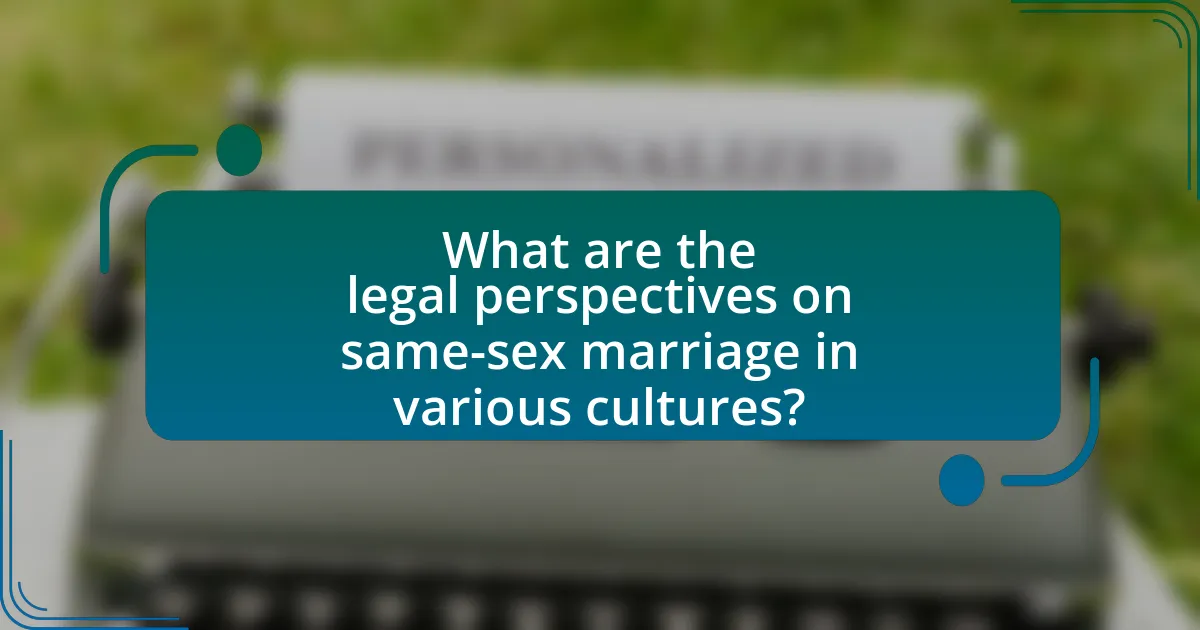
What are the legal perspectives on same-sex marriage in various cultures?
Legal perspectives on same-sex marriage vary significantly across cultures. In countries like the Netherlands, which legalized same-sex marriage in 2001, the law recognizes same-sex unions with the same rights as heterosexual marriages. Conversely, in many Middle Eastern nations, such as Saudi Arabia, same-sex relationships are criminalized, with severe penalties including imprisonment or even death. In the United States, the Supreme Court’s 2015 decision in Obergefell v. Hodges established same-sex marriage as a constitutional right, reflecting a shift towards greater acceptance. In contrast, countries like Uganda impose harsh penalties for homosexuality, including life imprisonment. These examples illustrate the diverse legal frameworks and societal attitudes towards same-sex marriage globally.
How do laws regarding same-sex marriage differ around the world?
Laws regarding same-sex marriage vary significantly across the globe, with some countries fully legalizing it, while others maintain bans or recognize only limited rights. For instance, as of 2023, countries like Canada, the Netherlands, and Spain have legalized same-sex marriage, granting equal rights to same-sex couples. In contrast, nations such as Saudi Arabia and Iran impose severe penalties for same-sex relationships, including imprisonment or even death. Furthermore, some countries, like the United States, allow same-sex marriage at the federal level but have states with varying degrees of acceptance and legal recognition. This disparity reflects cultural, religious, and political influences that shape the legal landscape for same-sex marriage worldwide.
What countries have legalized same-sex marriage, and what are their cultural contexts?
Countries that have legalized same-sex marriage include the Netherlands, Belgium, Canada, Spain, South Africa, Sweden, Norway, Portugal, Iceland, Argentina, Uruguay, Brazil, France, New Zealand, the United Kingdom, the United States, Germany, Australia, Taiwan, and several others.
The cultural contexts of these countries vary significantly. For instance, the Netherlands was the first country to legalize same-sex marriage in 2001, reflecting its progressive values and strong emphasis on individual rights. In contrast, South Africa’s legalization in 2006 was influenced by its post-apartheid constitution, which emphasizes equality and human rights.
In the United States, the Supreme Court’s decision in 2015 to legalize same-sex marriage nationwide was a culmination of decades of activism and reflects a broader cultural shift towards acceptance of LGBTQ+ rights. Similarly, countries like Argentina and Brazil have seen significant social movements advocating for LGBTQ+ rights, leading to their legalization of same-sex marriage in 2010 and 2013, respectively.
Overall, the legalization of same-sex marriage in these countries often correlates with broader cultural attitudes towards diversity, human rights, and social justice.
How do legal challenges impact the recognition of same-sex marriage in different regions?
Legal challenges significantly influence the recognition of same-sex marriage across various regions by either advancing or hindering legal reforms. For instance, in the United States, landmark cases such as Obergefell v. Hodges (2015) led to the nationwide legalization of same-sex marriage, demonstrating how judicial rulings can establish legal precedents that promote equality. Conversely, in regions where legal challenges are met with resistance, such as in parts of Africa and the Middle East, same-sex marriage remains unrecognized, reflecting the impact of cultural, religious, and political opposition. These legal battles often shape public opinion and legislative actions, ultimately determining the status of same-sex marriage in different jurisdictions.
What are the implications of legal recognition for same-sex couples in diverse cultures?
Legal recognition for same-sex couples in diverse cultures leads to increased social acceptance and legal protections. This recognition often results in enhanced rights related to marriage, adoption, and inheritance, which can significantly improve the quality of life for same-sex couples. For instance, countries like Canada and the Netherlands, which have legalized same-sex marriage, report higher levels of societal acceptance and lower rates of discrimination against LGBTQ+ individuals. Furthermore, legal recognition can challenge traditional norms and promote dialogue about gender and sexuality, fostering a more inclusive society. Studies indicate that legal frameworks supporting same-sex relationships contribute to mental health improvements among LGBTQ+ individuals, as they experience reduced stigma and increased visibility.
How does legal recognition affect the social status of same-sex couples?
Legal recognition significantly elevates the social status of same-sex couples by providing them with equal rights and societal validation. This recognition often leads to increased acceptance and visibility within communities, as it affirms their relationships as legitimate and equal to heterosexual partnerships. Studies, such as those conducted by the Williams Institute, indicate that legal recognition correlates with improved mental health outcomes and reduced stigma for same-sex couples, demonstrating that societal attitudes shift positively when legal frameworks support equality.
What benefits do legally recognized same-sex marriages provide to couples?
Legally recognized same-sex marriages provide couples with numerous benefits, including legal rights, financial advantages, and social recognition. These benefits encompass access to spousal health insurance, tax benefits such as joint filing, inheritance rights, and the ability to make medical decisions for a partner. Research indicates that legal recognition of same-sex marriage leads to improved mental health outcomes for LGBTQ+ individuals, as it fosters social acceptance and reduces stigma. For instance, a study published in the American Journal of Public Health found that states allowing same-sex marriage saw a significant decrease in suicide rates among LGBTQ+ youth. Thus, the legal recognition of same-sex marriages not only affirms the couples’ commitment but also enhances their overall well-being and societal standing.
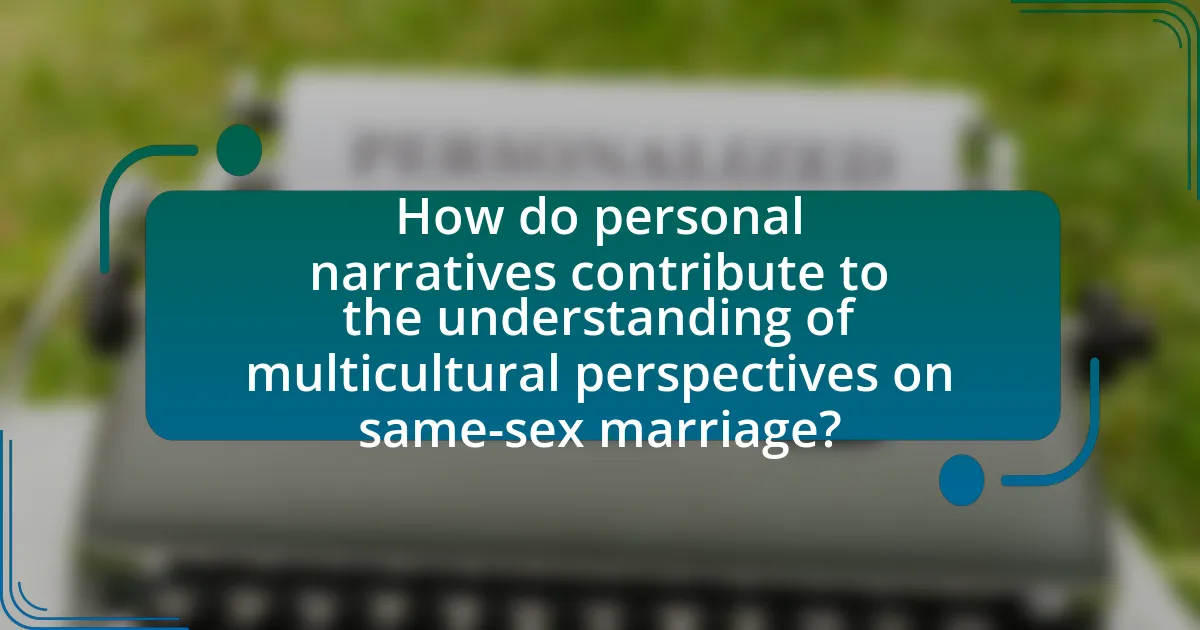
How do personal narratives contribute to the understanding of multicultural perspectives on same-sex marriage?
Personal narratives significantly enhance the understanding of multicultural perspectives on same-sex marriage by providing firsthand accounts that reflect diverse cultural contexts and experiences. These narratives illustrate how individuals from various backgrounds navigate their identities and relationships within the framework of their cultural norms and values. For instance, studies have shown that personal stories from LGBTQ+ individuals in different cultural settings reveal unique challenges and acceptance levels, highlighting the intersectionality of race, religion, and sexual orientation. This diversity in narratives fosters empathy and awareness, allowing broader societal discussions to encompass the complexities of same-sex marriage across different cultures.
What stories highlight the intersection of culture and same-sex marriage?
Stories that highlight the intersection of culture and same-sex marriage include the experiences of LGBTQ+ individuals in various cultural contexts, such as the legal battles for marriage equality in countries like South Africa, where the 1996 Constitution explicitly prohibits discrimination based on sexual orientation, making it one of the first nations to legalize same-sex marriage in 2006. Additionally, the narratives of same-sex couples in countries like India, where the Supreme Court decriminalized homosexuality in 2018, reflect the cultural shifts and ongoing struggles for acceptance within traditional frameworks. These stories illustrate how cultural values and legal recognition of same-sex marriage evolve together, showcasing the diverse experiences and challenges faced by LGBTQ+ individuals globally.
How do individual experiences reflect broader societal attitudes towards same-sex marriage?
Individual experiences of same-sex marriage often mirror broader societal attitudes by illustrating the acceptance or resistance individuals face within their communities. For instance, in regions where same-sex marriage is legally recognized and socially accepted, personal narratives frequently highlight positive experiences, such as family support and community celebration, reflecting a progressive societal stance. Conversely, in areas where same-sex marriage remains stigmatized or illegal, individual accounts often reveal challenges such as discrimination, familial rejection, and social ostracism, indicating entrenched societal opposition. Research by the Pew Research Center shows that acceptance of same-sex marriage has increased significantly over the past two decades, with 70% of Americans supporting it in 2021, which aligns with the growing number of positive individual experiences reported in supportive environments. Thus, individual experiences serve as a microcosm of the larger societal landscape regarding same-sex marriage, revealing the interplay between personal narratives and collective attitudes.
What role do activists play in sharing personal narratives about same-sex marriage?
Activists play a crucial role in sharing personal narratives about same-sex marriage by amplifying voices and experiences that highlight the emotional and social significance of these unions. Through storytelling, activists humanize the legal and political aspects of same-sex marriage, making the issues more relatable and impactful for broader audiences. For instance, personal narratives can illustrate the struggles faced by LGBTQ+ individuals in their pursuit of love and recognition, fostering empathy and understanding among those who may not have direct experience with these challenges. Research indicates that personal stories can significantly influence public opinion; a study by the Williams Institute found that exposure to personal narratives about same-sex relationships can increase support for marriage equality. Thus, activists effectively utilize personal narratives as a powerful tool for advocacy and social change.
How can we promote multicultural understanding in discussions about same-sex marriage?
Promoting multicultural understanding in discussions about same-sex marriage can be achieved by fostering inclusive dialogues that respect diverse cultural perspectives. Engaging community leaders from various cultural backgrounds in conversations about same-sex marriage can help bridge gaps in understanding and highlight the intersection of cultural values and LGBTQ+ rights. Research indicates that inclusive discussions can lead to greater acceptance; for instance, a study by the Williams Institute found that increased dialogue within communities correlates with higher support for same-sex marriage across different cultural groups. Additionally, educational programs that incorporate multicultural viewpoints on love and family can further enhance understanding and acceptance.
What strategies can be employed to encourage dialogue across cultures?
To encourage dialogue across cultures, implementing strategies such as active listening, cultural exchange programs, and inclusive communication practices is essential. Active listening fosters understanding by allowing individuals to fully engage with differing perspectives, which can reduce misunderstandings and promote empathy. Cultural exchange programs, such as international student exchanges or community cultural events, provide opportunities for individuals to experience and appreciate diverse traditions and viewpoints firsthand. Inclusive communication practices, including the use of neutral language and avoiding cultural stereotypes, help create a safe space for open dialogue. These strategies are supported by research indicating that intercultural communication competence enhances mutual respect and reduces conflict, as highlighted in studies by the Intercultural Communication Institute.
How can educational initiatives foster a better understanding of diverse perspectives on same-sex marriage?
Educational initiatives can foster a better understanding of diverse perspectives on same-sex marriage by incorporating comprehensive curricula that include historical, cultural, and legal contexts surrounding the topic. For instance, programs that explore the evolution of same-sex marriage rights across different cultures and legal systems can highlight varying societal attitudes and beliefs. Research indicates that educational settings that promote open discussions and critical thinking about LGBTQ+ issues lead to increased empathy and reduced prejudice among students. A study published in the Journal of Homosexuality found that inclusive educational practices significantly improve students’ understanding of diverse sexual orientations and relationships, thereby enhancing acceptance and respect for differing viewpoints on same-sex marriage.
What are practical steps for advocating for multicultural perspectives on same-sex marriage?
Practical steps for advocating for multicultural perspectives on same-sex marriage include engaging diverse communities through dialogue, education, and collaboration. Initiating community forums allows individuals from various cultural backgrounds to share their views and experiences regarding same-sex marriage, fostering understanding and respect. Educational workshops can be organized to inform participants about the intersection of culture and LGBTQ+ rights, highlighting how different cultures perceive same-sex relationships. Collaborating with multicultural organizations can amplify advocacy efforts, ensuring that diverse voices are represented in discussions and policy-making. Additionally, utilizing social media platforms to share stories and resources can reach a broader audience, promoting inclusivity and awareness. These steps are essential for creating a supportive environment that respects and celebrates multicultural perspectives on same-sex marriage.
